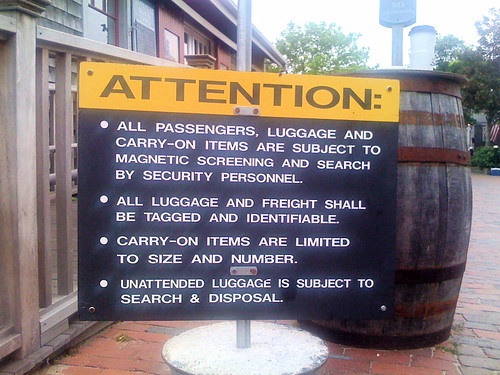Aha! That Too!
A few days ago, Margaret and I indulged in a trip to the movies to see Wanted (couldn’t they have come up with a name more congruent with the movie?) — which bears some relevance to my post from a couple of days ago, and to David’s generous response thereunto. Really!
First, I should respond to some friends who asked what we thought about the movie. I appreciated James McEvoy’s performance, and the first portion of the film successfully elicited my interest in McEvoy’s character and his prospects. The dénouement, however, lapsed toward (very well-executed) conventional action-film resolutions. It illustrates the Matrix quandary of adrenalin movies: it’s a lot easier to come up with a come up with an ingenious conceit for an exciting movie than it is to bring such an innovative premise to an equally convincing closure (or a satisfying lack-of-closure). It’s as though McEvoy’s Wesley Gibson evolves from a pallid, doughy Anyman into a vibrant, powerful, ultraviolent Anysuperman.
And if it makes any sense to ask this question of a movie whose leading attraction is Angelina Jolie as a character named “Fox,” what’s with the absence of women in the world of this movie? Gibson has a girlfriend (who’s having an affair, enacted on-screen at least twice, with Gibson’s “best friend”) and Jolie reminds us of what we enjoyed watching in the Tomb Raider movies, but all the other active figures in this world are male (and the girlfriend is obviously throw-away character) (one hesitates to call her “one-dimensional,” since her three-dimensionality helps explain her presence in the script). It’s all especially odd since the film justifies some plot developments with mumbo-jumbo about genetics, but doesn’t (to my recollection) mention Gibson’s mother at all.
But to the “fallacy of examples” point: at a pivotal moment in the plot, Wesley questions the murderous raison d’être of the organization he was training to join. My sympathies surged; would the movie actually grapple with the ethics of vigilantism? No such luck. In response, Fox recounts a “one that got away” anecdote that presumably justifies the assassins’ Hollywood justice.
In the context of reasoning from examples, Fox’s story exemplifies all the dangers to which David and Ethan (and I) point. At this stage of the movie, Gibson adduces the laudable moral principle that it just ain’t right to go around killing people outside a public system of judicial discernment, and he senses that an innocent person might be killed, or that killing the guilty might not be adequately morally commendable. However vigorously some of us can insist that he was right so to do, the movie — and the cultural impulses to which it appeals — assert the contrary anecdotal ethic that vigilante assassination effects justice and averts innocent suffering, because Jolie/Fox presumes that if a particular malefactor has been killed on schedule, he would not have killed her father before her eyes. But this justification by example occludes other possibilities: the Bad Guys might have sent a different (even more brutal!) killer, or the Good Guy assassin might have himself killed an innocent, or Good Guy might not have been as good as he is supposed to have been, nor Bad Guy as bad, or any of a skillion other possible outcomes. Nope, the only solution would have been for Good Guy to kill Bad Guy on schedule.
I suspect that the cogency of anecdotal reasoning (for Kristol and for Angelina Jolie and for Ronald Reagan and for various cultures and discourses) still prevents my identifying it as a fallacy except from within a cultural discourse that identifies specific shortcomings of reasoning from examples. There’s still a wisdom to be apprehended about narrative, examples, anecdotes, and valid reasoning (as Lyotard suggests in Postmodern Condition and various other writings on justice).
Apart from that, (a) curving bullets’ trajectories was cool, and (b) a movie riddled with this many bullet wounds still shouldn’t have so many holes in it.




